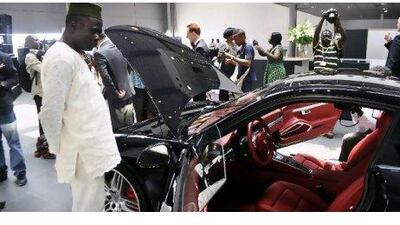"Millionaire at 29? That's five years too late," barks a brash mobile phone advertisement in Lagos.
The billboard, depicting a young man in a sharp suit in one of the Nigerian city's more upmarket neighbourhoods, neatly encapsulates the get-rich-quick attitude that prevails in the country's urban areas.
Luxury cars and large, gated villas are a common sight in Lagos. Step inside the plush hotels and men in expensive-looking silk shirts chatter on mobile phones and women clutch designer handbags.
Nigeria has nearly 100 million people living on less than US$1 (Dh3.67) a day. But in a country where the gap between the rich and poor is glaring, it also has a growing band of wealthy elite including more than 2 million dollar millionaires.
Many have earned their money either through the country's oil wealth or by capitalising on the burgeoning consumer market.
The challenge for Nigeria now, however, is how to get this growing wealthy elite to invest their cash at home.
"There's only 1 per cent of Nigerians that have serious amounts of money but those that do want somewhere to invest and there are not many areas for them to invest in Nigeria, so they look outside," says Harry Smith, a sales manager at The First Group, a property company based in Dubai.
In many ways the country's infrastructure has not kept pace with the aspirations of the wealthy.
Roads are choked with traffic, shopping malls are undeveloped and business people grumble about a shortage of decent hotels and restaurants and the poor standard of domestic air travel. Partly for these reasons, many flock to London, New York, Paris and, increasingly, Dubai for large parts of the year.
For Princess Fifi Ejindu and her husband Chief Onyemaechi Ejindu, Dubai offers an opportunity to combine business and leisure.
Princess Fifi, who heads an investment company based in Abuja, the Nigerian capital, held a glittering 50th birthday party at the Burj Al Arab hotel in Dubai last month.
"The shopping in Dubai is incredible, the restaurants are beautiful and the nightlife is wonderful," she says. From the mid 2000s, the couple have bought and sold a number of apartments in Jumeirah Beach Residence, Jumeirah Lake Towers and Palm Jumeirah as well as retail units in International City.
Even losing money in the Waterfront, a Nakheel development planned but never built on the edge of Dubai, has not dimmed their love for the city.
"I still believe in the Dubai dream," says Princess Fifi. Nigeria's own property scene is in an earlier stage of progress. Billboards on Lagos' Bar Beach advertise Atlantic City, an ambitious mixed-use development with echoes of projects dreamed up in Dubai's boom years. Described by the 1986 Nobel Prize winner Wole Soyinka as "rising like Aphrodite from the foam of the Atlantic", the project is designed to provide homes for 250,000 people and offices and other workplaces for another 150,000 across several kilometres of reclaimed land.
Business people say similar investment is needed in the retail sector.
Big international shopping chains are largely absent from the malls in the main cities. Limits on the import of materials, designed to nurture local industries, make it difficult for foreign retailers to bring in clothing and furnishings.
"The government has to create an enabling environment, like a shopping free zone, to enable these retail chains to come in," says Princess Fifi.
Until that happens most wealthy Nigerians are likely to continue to do the bulk of their shopping and property buying abroad.

